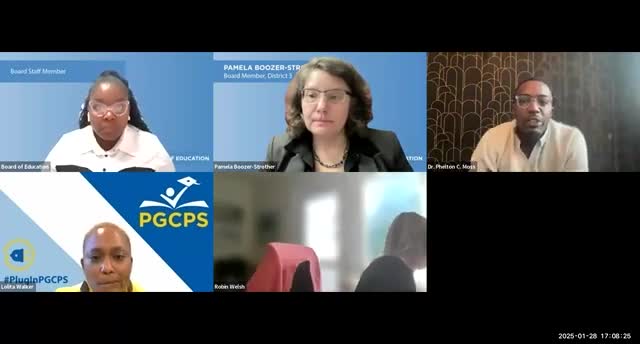PGCPS policy committee opposes proposed high‑school childcare mandate, raises funding and implementation concerns; mixed response on drug‑detection bill
Get AI-powered insights, summaries, and transcripts
Subscribe
Summary
Prince George's County Board of Education Policy and Governance Committee Chair Dr. Felton Moss convened the committee Jan. 28 and opened a legislative update that focused on several bills from the Maryland General Assembly that could affect school operations and budgets.
Prince George's County Board of Education Policy and Governance Committee Chair Dr. Felton Moss convened the committee Jan. 28 and opened a legislative update that focused on several bills from the Maryland General Assembly that could affect school operations and budgets.
The most contested measure discussed was House Bill 359, which would require every high school with a pregnancy rate greater than 1% to establish an on‑site child care center tied to career and technical education (CTE) and early childhood programs. “We have opposed this bill,” Staff member Robin Welch told the committee, citing funding and facility constraints. Welch said the bill includes a $5,500,000 governor appropriation in its text and a provision for the county to receive $10 per child‑support case, but she and administrative staff flagged the funding as uncertain and the operational cost as substantial.
Why it matters: Committee members said the district lacks the classroom space, staff and MSDE approvals needed to add a new CTE child development program at every high school, and they warned the bill would function as an unfunded mandate if the state appropriation does not materialize. Board member Booser Struthers said the community had lost a built‑in daycare and CTE program at Northwestern High School in recent years and urged continued work with Delegate Tavares on local solutions, while stressing the board’s concern about taking on statewide mandates without guaranteed funding.
On House Bill 379, which would make drug‑spiking detection products and drug‑detection strips available in every county middle and high school (including in health rooms, libraries and bathrooms), opinions were more mixed. Welch said the administration’s principal concern is again funding and logistics: widespread placement of detection products across every building would be “an unfunded mandate” unless the bill specifies funding or enables a clear federal grant path.
Board member Booser Struthers and others said they were not opposed to the harm‑reduction intent of HB 379 if the bill explicitly clarifies there will be no cost to local school systems. “If we support it, it has to be supported with the amendment that there would be no cost to the school,” Booser Struthers said, noting testimony from the bill sponsor that federal grant funding might be available. Welch told the committee the bill had not yet been amended to include specific funding language and that the administration is concerned that pursuing competitive federal grants can itself require staff time and local match documentation.
Other bills flagged by staff during the update included: - House Bill 370 (Office of Integrity and Compliance): Welch said the administration supports the bill because it would make the office independent of PGCPS payroll and allow county oversight and legal support, while shifting associated costs to the county. - House Bill 377 (parental engagement leave): Welch and staff pointed to operational and fiscal concerns. The administration estimated roughly 9,500 employees could be eligible and offered a preliminary cost estimate of about $11.2 million, and said the proposed tax credit in the bill would not benefit a tax‑exempt employer such as the school system. - Multiple cell‑phone bills: Welch said the district opposes four different bills that would impose state requirements on student phone use, noting that board policy already governs phone use and that state legislation would infringe on local board authority. - Senate Bill 109 and related ethics‑training measures: Welch recommended support, noting the board already meets many disclosure and training requirements and that the bill would largely codify existing practice. - Senate Bill 429 / House Bill 504 (Excellence in Maryland Public Schools Act): Welch said this is a major education budget bill with substantive changes that staff are still analyzing; she asked committee members to expect a separate meeting to review that bill in detail.
Committee directions and next steps: Committee members asked staff to draft position language and testimony, especially for HB 359 and HB 379, and to meet with local delegates to explain PGCPS operational constraints and funding concerns. Chair Moss said the committee will prepare formal input for the delegation’s meetings; Welch said the delegation has requested any position statements by Thursday for an upcoming delegation meeting.
The committee also asked staff to circulate model position templates (support, support with amendments, oppose) so members can provide consistent, succinct testimony. Welch said she would collect financial and programmatic clarifications from Finance and Academic divisions and circulate a summary to the committee.
Ending: Committee members emphasized their interest in collaborating with local delegates to find solutions for childcare access and school‑based prevention while avoiding unfunded mandates that could shift costs onto the county school system.
